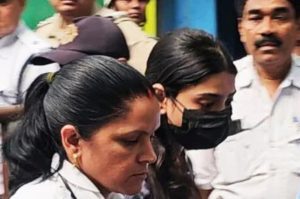“Don’t Turn Bengal into North Korea”: The arrest of 22-year-old law student and Instagram influencer Sharmishta Panoli by the Kolkata Police has sparked a political and constitutional crisis, triggering impassioned responses from national leaders, legal luminaries, and civil society. What began as a video posted on Instagram has evolved into a fiery national debate on freedom of speech, selective outrage, political policing, and the overreach of state authorities.
Prominent public figures such as Kangana Ranaut and Pawan Kalyan have come forward in her defense, with Kangana cautioning that West Bengal risks resembling North Korea under its current political climate. As hashtags like #FreeSharmishtaPanoli and #WestBengalCensorship trend on social media, questions arise: Where do we draw the line between freedom of expression and incitement? And are the police actions truly lawful, or do they reveal deeper issues within India’s federal democratic structure?

Who is Sharmishta Panoli?
Sharmishta Panoli is a 22-year-old law student based in Pune and a rising social media influencer known for her political commentary and unapologetic takes on national issues. With over 150,000 Instagram followers at the time of her arrest, Panoli often used her platform to engage on topics such as Hindu identity, women’s rights, national security, and more recently, Operation Sindoor—a trending topic among nationalists following increased Indo-Pakistan tensions.
Panoli, unlike many influencers who stick to lifestyle content, belongs to a new breed of social media commentators who use Instagram reels and live videos to voice bold, often controversial, views. Her arrest has now thrust her into the national spotlight.


The Instagram Video That Sparked Controversy
The controversy centers around a short video Panoli posted on Instagram in May 2025, where she made remarks that the Kolkata Police described as “communal and derogatory.” According to the FIR, her video allegedly targeted certain religious communities while commenting on Operation Sindoor, an anti-terror initiative rolled out by the Indian government.
Police claim the video was “intended to provoke communal unrest” and amounted to “hate speech,” citing provisions under Sections 153A and 295A of the Indian Penal Code. However, Panoli’s supporters argue that the video—while strongly worded—was not incitement but political opinion protected under Article 19(1)(a) of the Constitution.
“Don’t Turn Bengal into North Korea”: The Arrest and Judicial Custody
Panoli was detained in Gurugram on a transit remand by Kolkata Police and transported to Alipore Court, where she was remanded to 14 days judicial custody. The arrest was conducted without any prior summon or warrant made public. Legal observers note that the swiftness of the arrest, and the location (a different state), raises concerns about interstate police coordination and federal overreach.
As of June 2025, Panoli remains in judicial custody while her legal team prepares a bail petition citing constitutional violations and misuse of police powers.
Kangana Ranaut and Pawan Kalyan Speak Out
National figures quickly responded to the arrest:
Kangana Ranaut:
The Bollywood actress and BJP MP criticized the West Bengal government, posting:
“Are we living in North Korea or West Bengal? If women expressing their views are arrested this way, it’s not democracy—it’s dictatorship.”
Kangana likened Panoli’s arrest to authoritarian tactics and questioned why certain political ideologies are protected while others are persecuted.
Pawan Kalyan:
Andhra Pradesh Deputy CM and Jana Sena Party leader Pawan Kalyan condemned the arrest and accused the West Bengal government of “selective secularism.”
“Why are Hindu voices always punished? Is this the India we want? Where is the voice of justice?”
Bar Council of India Steps In
Perhaps the most serious institutional rebuke came from the Bar Council of India (BCI). Its chairman, Manan Kumar Mishra, not only condemned the arrest but also wrote a formal letter to the Chief Justice of India urging judicial intervention.
In his statement, Mishra said:
“The arrest of a law student and budding lawyer for merely expressing her views is both illegal and unethical. It violates the spirit of free legal discourse and the core of our Constitution.”
He demanded immediate release and threatened legal action against police officers who overstepped their bounds.
Police Justification: “Panoli Was Absconding”
Facing mounting criticism, the Kolkata Police issued a statement clarifying their actions. According to them, the arrest was not politically motivated but based on actionable intelligence and evidence. They claim:
-
The content in Panoli’s video had potential to disturb public order.
-
She had been served notices but failed to appear.
-
Her “fugitive behavior” justified the urgent transit remand.
However, no formal summons or public disclosure of notice issuance was presented to the media—raising doubts over procedural fairness.
Operation Sindoor: The Larger Context
Panoli’s video was related to Operation Sindoor, a recently launched nationwide civil defense and intelligence initiative following the Pahalgam terror attack that killed 26 tourists. The operation involved high-level surveillance, increased border activity, and monitoring of public communication—including social media platforms.
Critics argue that the operation has become a tool for monitoring dissent, and Panoli’s arrest is a prime example of this overreach.
National Outrage: Social Media and Civil Society React
The hashtag #FreeSharmishtaPanoli started trending within hours of the arrest. Influencers, academics, and ordinary citizens voiced concern over what they see as creeping censorship and a dangerous precedent for freedom of expression in India.
Notable reactions include:
-
Prashant Bhushan, senior advocate: “This is not law enforcement, this is political enforcement.”
-
Swara Bhaskar, actress: “While I disagree with her ideology, she deserves her rights as an Indian citizen.”
-
Shefali Vaidya, columnist: “A young Hindu woman jailed for speaking while radical hate preachers roam free. Shame!”
Media Coverage and Double Standards
Interestingly, mainstream national media coverage was initially muted. Only after social media backlash did outlets like Times of India, India Today, and Economic Times pick up the story. This delay has fueled allegations of media bias and selective outrage, especially when compared to high-coverage cases involving activists from other ideological backgrounds.
Several analysts questioned whether the story would have garnered immediate national headlines had Panoli belonged to a different political orientation.
Free Speech in India: A Legal Crisis?
Panoli’s arrest renews the decades-old debate about free speech in India. Article 19(1)(a) guarantees freedom of expression, but it comes with “reasonable restrictions” under Article 19(2), such as public order, decency, morality, and incitement to an offense.
The crux of the issue is whether Panoli’s video constitutes incitement or is merely politically charged speech—which in a democracy, should be protected.
Legal experts point to landmark cases such as:
-
Shreya Singhal v. Union of India (2015) – where Section 66A of the IT Act was struck down for curbing online free speech.
-
S. Rangarajan v. P. Jagjivan Ram (1989) – asserting that the freedom of expression cannot be suppressed unless the situation created is dangerous to public interest.
What Comes Next? Legal Remedies and National Repercussions
Panoli’s legal team has filed a writ petition in the Calcutta High Court, arguing for:
-
Immediate bail
-
Quashing of the FIR
-
Monetary compensation for unlawful detention
-
Contempt proceedings against Kolkata Police
If the case escalates to the Supreme Court, it could result in a historic judgment clarifying the boundaries of speech vs hate, especially in digital spaces.
Conclusion: A Watershed Moment for Indian Democracy
The Sharmishta Panoli arrest is more than a social media story—it’s a litmus test for India’s commitment to democratic values. As political lines harden and the judiciary faces pressure to act, this case could redefine how India views free expression in the digital era.
Will it serve as a warning against political overreach? Or become a cautionary tale for every Indian daring to dissent online?
The answers to these questions may very well shape the future of civil liberties in the world’s largest democracy.
DO FOLLOW:
West Bengal Government Official Website
Ministry of Home Affairs (MHA)
Also read: Home | Channel 6 Network – Latest News, Breaking Updates: Politics, Business, Tech & More

